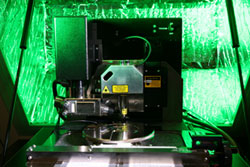To help facilitate a transition into the era of nanoscale-integrated systems, professors at the University of Houston Cullen College of Engineering are developing a nanoengineering (NEMO) minor option.
The minor is slated to be a choice at the college as early as fall 2009, upon approval by the university's provost office.
Receipt of a $200,000 grant from the National Science Foundation last month is expected to fund the cost associated with the start of the program.
Coordinating its launch is Dmitri Litvinov, professor of electrical and computer engineering. Litvinov, along with Associate Dean and Professor of Electrical and Computer Engineering Fritz Claydon; Stuart Long, professor of electrical and computer engineering; Hanadi Rafai, professor of civil and environmental engineering; Pradeep Sharma, Bill D. Cook associate professor of mechanical engineering and Ramanan Krishnamoorti, M.D. Anderson professor of chemical and biomolecular engineering, will play active roles in its implementation.
“We are trying to structure it so it’s relevant to all disciplines,” Litvinov said of the new minor. “The program will capitalize on the synergy between the extensive undergraduate education infrastructure and the state-of-the-art nanotechnology research programs at the college. The long-term goal is to introduce nanoscale science, engineering and technology through a variety of interdisciplinary approaches.”
The minor integrates the three courses on nanoengineering already taught at the college with new courses in a structured nanoengineering curriculum.
The courses, Litvinov said, are combined with laboratory elements designed to provide hands-on experience working with nanotechnology instrumentation and fabrication techniques. Design projects challenging students to build a device incorporating components of nanotechnology as well as professional development activities teaching effective technical writing and maintaining scientific records will all be part of the curriculum.
Inclusion in the program will be competitive, with just 25-30 students enrolled each year. Only students in their junior year holding a GPA of 3.0 will be considered. Past academic performance and an oral interview will be further factors in selection.
